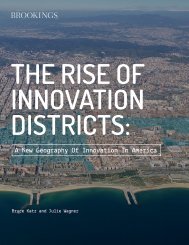TECHNOLOGY AT WORK
1Oclobi
1Oclobi
Create successful ePaper yourself
Turn your PDF publications into a flip-book with our unique Google optimized e-Paper software.
12<br />
Citi GPS: Global Perspectives & Solutions February 2015<br />
The digital age has broken the historical<br />
observation that shares in national income<br />
accrue to capital and labour in a constant<br />
manner<br />
Digital technologies can also make capital<br />
less relevant<br />
So far, the digital age has been the age of capital rather than the era of labour. This<br />
sheds a different light on the six stylised facts about economic growth Nicholas<br />
Kaldor famously published in 1957. Having observed remarkable historical<br />
consistency in the shares of national income accruing to capital and labour<br />
respectively over longer periods of time, he concluded that these shares are roughly<br />
constant — an assumption that is still at the heart of many growth models. 19 As the<br />
labour share of GDP has steadily declined over the past decades, across countries,<br />
this assumption has nevertheless become difficult to maintain.<br />
Yet, in the future, digital technologies could also increasingly substitute for capital.<br />
Crucially, the digital economy allows many goods and services to be codified, and<br />
once codified, they can be digitised and replicated. Furthermore, as has been<br />
pointed out by Erik Brynjolfsson, Andrew McAfee and Michael Spence: “digital<br />
copies can be made at virtually zero cost and transmitted anywhere in the world<br />
almost instantaneously, each an exact replica of the original.” 20 Consider Twitch, a<br />
live streaming video platform employing some 170 workers, which was acquired by<br />
Amazon.com for $970 million in September 2014. While receiving venture capital<br />
(VC) funding, the company did not need much physical capital relative to the<br />
industrial giants of the past. The same is true of Instagram and WhatsApp: both did<br />
not need much capital investment to get started, and thus not many workers to build<br />
up the new capital.<br />
While digital technologies increasingly substitute for labour, they may also reduce<br />
the demand for capital. In the digital age, innovators and entrepreneurs, not workers<br />
or investors, will be the main beneficiaries.<br />
Meeting the Challenge<br />
The speed of technology diffusion has<br />
increased…<br />
Technologies are diffusing much faster now than they have in the past. Historically,<br />
countries have adopted a new technology on average 45 years after its invention,<br />
although the lag has shortened over time. It took on average 119 years for the<br />
spindle to diffuse outside Europe. By contrast, the Internet has spread across the<br />
globe in only seven years. The extent to which new technologies have been<br />
adopted still varies substantially across countries and can account for some 25% of<br />
the differences in nations’ per capita income today. 21 However, as adoption lags<br />
become shorter, the rich world’s advantage of being an early adopter will inevitably<br />
decrease.<br />
Figure 5 shows the shortening of the lag in adoption, from telephones needing 75<br />
years to get to fifty million users, to Angry Birds taking just 35 days. Services like<br />
Instagram reached 300 million users in just four years and Forbes recently noted<br />
that WhatsApp gained more followers in its six years of existence (700m) than<br />
Christianity did in its first nineteen centuries.<br />
19 Kaldor (1957).<br />
20 Brynjolfsson, McAffe and Spence (2014).<br />
21 Comin and Hobjin (2010).<br />
© 2015 Citigroup










